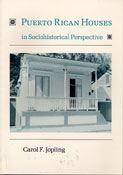Puerto Rican Houses in Sociohistorical Perspective

- Author(s): Jopling, Carol
- Series:
- Imprint: Univ Tennessee Press
- Publication Date: 1992-09-30
- Status: Active
- Available in Paper: Price $18.00 | Buy Now
In the centuries after Columbus visited Puerto Rico, the island’s society was shaped and reshaped by successive waves of European, Caribbean, and North American influence. Puerto Rican Houses in Sociohistorical Perspective traces this historical development in the forms of the island’s varied and colorful domestic architecture.
Drawing on extensive surveys of building exteriors and interiors and on interviews with occupants, the author proposes a typology of house forms, outlines the distribution of house types among socioeconomic groups, and interprets the social messages communicated by the forms, decoration, and furnishings of the houses. Ultimately, this book illuminates how Puerto Rico’s dwellings articulate with its society as a whole. Copious photographs and drawings illustrate key findings.
Far more than a local study, Puerto Rican Houses in Sociohistorical Perspective is the first work to describe the architecture of an entire complex society, from the inventive self-built dwellings of the poor to the elegant mansions of the rich. Detailing the manner in which architecture develops within such a society, Carol F. Jopling applies semiotic and symbolic analyses to the study of architecture. In so doing, she makes a signal contribution to the methodology of material culture research.
“This book extends the scope of American vernacular architecture research into the Caribbean. It presents such a thorough and thoughtful survey of domestic building that the way is now opened to others to pursue questions of a comparative and interpretive nature. The unexpected variety of the island’s houses is sure to be an eye-opener even to well-traveled fieldworkers.”
—John Michael Vlach, George Washington University
“Carol Jopling has made an impressively thorough reconnaissance of the Puerto Rican house. In this book she gives us an instructive typology of the diversity of house types, anchoring that typology in the history of Puerto Rico and the dynamics of acculturation among Indians, Spaniards and other Europeans, Africans, and continental Americans. She also addresses in a novel way the relation between house types and the dynamics of the social order and the class system. The anthropologist’s interest in the meaning of material structures—their symbolic content—is addressed insightfully.”
—James W. Fernandez, University of Chicago
The Author: Carol F. Jopling holds a Ph.D. in anthropology from the University of Massachusetts at Amherst. In addition to teaching at Tufts University and the University of Massachusetts, Boston, she has been a research associate at the Peabody Museum and a staff member of the
